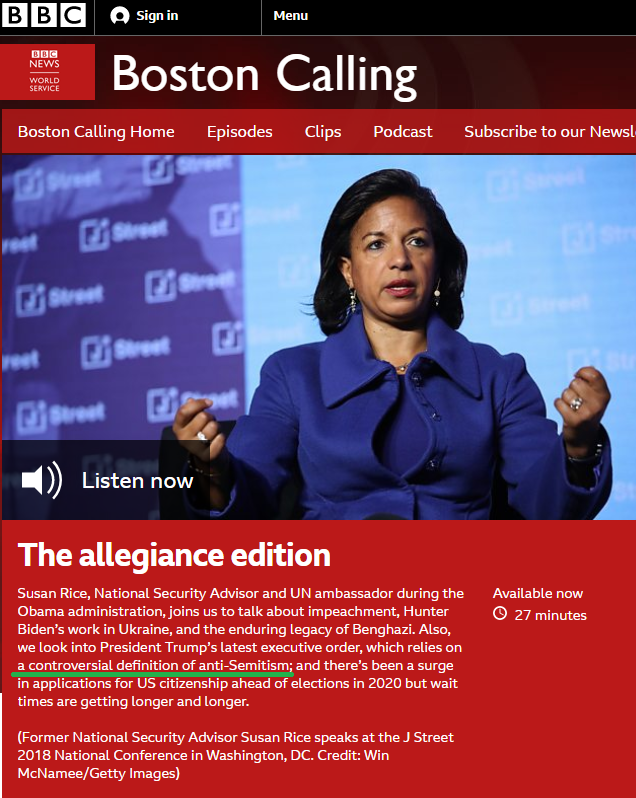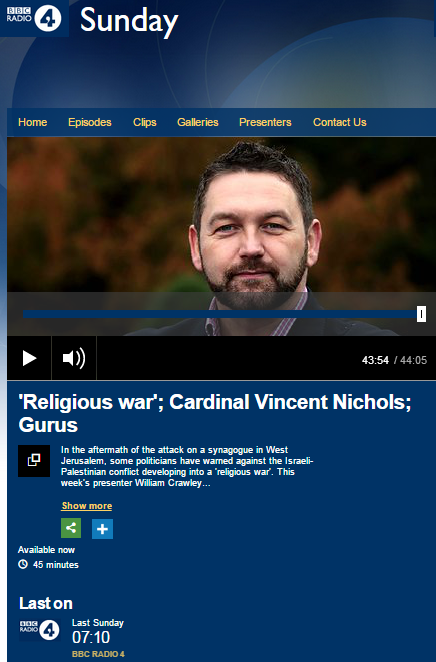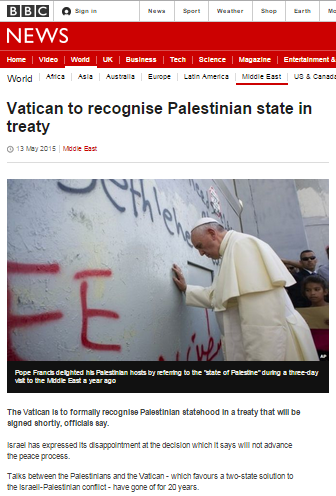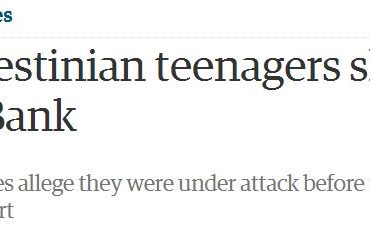h/t SG
The December 22nd edition of the BBC World Service radio programme ‘Boston Calling’ – titled “The allegiance edition” – included an item (from 08:56 here) described in its synopsis as follows:
“Also, we look into President Trump’s latest executive order, which relies on a controversial definition of anti-Semitism…” [emphasis added]
The working definition of antisemitism which the BBC World Service found fit to portray as “controversial” is that produced by the International Holocaust Remembrance Alliance (IHRA) which has been adopted by governments and bodies around the world.
Presenter Carol Hills (of PRI) chose to introduce the item with an unexplained reference to ‘allegiance’ which might well be considered inappropriate given the subject matter of antisemitism.
[emphasis in italics in the original, emphasis in bold added]
Hills: “In these divided times there are still some things we agree on. Few people, for example, would not agree that antisemitism is bad and that we should do something about it. But the agreement ends there because as soon as you start asking people what is antisemitism, who is guilty of it and what to do about it, that’s when you run into disagreements and in some cases allegiance comes into question. This became clear after President Trump signed his latest executive order. Our own Rupa Shenoy has more.”
Rupa Shenoy – also of PRI – began with a superficial description of the executive order signed on December 11th which is ostensibly the subject matter of her report.
Shenoy: “Hanukkah came early at the White House as President Trump recounted what he’d done for the Jewish people and said he was adding to that legacy by signing a powerful executive order.”
Recording Trump: “This action makes clear that Title VI of the Civil Rights Act which prohibits the federal funding of universities and other institutions that engage in discrimination applies to institutions that traffic in antisemitic hate.”
Shenoy: “He noted that Congress and the previous administration had tried to do something similar but those efforts stalled.”
Recording Trump: “But this year there’s no roadblock because I’m doing it myself. It’s much easier.”
Shenoy: “And Trump made the intent of his order clear.”
Recording Trump: “This is our message to universities: if you want to accept the tremendous amount of federal dollars that you get every year, you must reject antisemitism. It’s very simple.”
Shenoy: “The order recommends that universities define antisemitism with this specific language as -quote – a certain perception of Jews which may be expressed as hatred towards Jews including – quote – rhetorical and physical manifestations of antisemitism. Ken Stern helped craft that definition originally for the International Holocaust Remembrance Alliance.”
Ken Stern did not ‘help craft’ the IHRA definition. He did help write – along with some eight others – its predecessor for a now defunct EU agency called The European Union Monitoring Centre on Racism and Xenophobia. Seeing as Stern has repeatedly voiced his opinion that the IHRC is not suitable for use on campuses because he regards them as a special ‘free speech’ environment, the views he expresses in this report do not come as much of a surprise.
Stern: “It was never intended as something to police speech on campus.”
Shenoy: “Because he says there’s no similar definition of racism for example. And Stern says the Department of Education has made clear that Title VI already covers Jewish students.”
Stern: “Jewish students are being targeted regardless if they’re pro-Israel or anti-Israel, simply because they’re Jewish. That’s something that’s actionable and a concern. But the use of this definition is part of a long-standing pattern to try to curtail political speech about Israel.”
Shenoy then brought in a second voice supporting the same view – but failed to meet BBC editorial guideline requirements to inform audiences of the “affiliations, funding and particular viewpoints” of her contributor and the organisation she currently represents.
Shenoy: “Others have come to the same conclusion about Trump’s executive order. Lara Friedman is president of the Foundation for Middle East Peace.”
Friedman: “What it says is when it comes to criticising Israel, Jews equal Israel, Israel equals Jews. If you are on campus and you only talk about Israel and you’re criticising Israel, you are by definition antisemitic. Under the definition offered here the Palestinian historic and lived narrative becomes antisemitism.”
Shenoy: “She says the order’s goal is to send a message to university administrators and organisers.”
Friedman: “We are watching you and we will make your life miserable; cost you time, there’ll be reputational costs, all of that. You could lose your federal funding if you dare cross the line so don’t even go near the line.”
Shenoy: “Friedman says Trump’s executive order is aimed at campus protests across the country that Trump sees as connected to a larger worldwide movement to boycott Israel called BDS. That’s short for boycott, divestment and sanctions.”
As is inevitably the case in BBC content, audiences did not receive any sort of explanation concerning the BDS campaign – including the particularly relevant fact that what that campaign ultimately seeks to achieve is the end of Israel as the Jewish state.
Recording Trump: “And as president I want to be very clear. My administration vigorously condemns the BDS campaign against Israel.”
Shenoy: “This is Trump earlier this week [actually December 8th] at the Israeli-American Council’s national summit in Florida.”
Recording Trump: “But sadly BDS has also made disturbing headway on American college campuses – you know that, don’t you? Here with us today is Adela Cojab, a recent graduate of New York University who courageously stood for Israel in the face of hostility and bigotry…”
Shenoy: “Adela Cojab got on stage and told the audience she was suing NYU because it failed to protect Jewish students from harassment. Now she tells me she feels validated by the presidential order.”
Cojab: “By signing this order he just expanded the definition of protected groups and it includes Jewish students of course. And that tells Jewish students everywhere that what they’re going through isn’t normal, it’s not OK. And it just clarifies that they can stand up.”
Shenoy: “And Cojab pushes back against the argument that the executive order will stifle free speech.”
Cojab: “I think that the process can very much not be antisemitic. I criticise Israel openly because I have thoughts but there’s a difference between criticising Israel and Israeli policy and Israeli administration and criticising Israel’s right to exist. Because when you say that you’re anti-Zionist you’re saying that you’re against Israel’s right to exist, which is destroying Israel.”
Having apparently brought in Cojab to balance the two voices already heard, Shenoy then promoted a third view opposing the executive order. She did not however bother to clarify to listeners that her interviewee is a member of ‘Students for Justice in Palestine’ (SJP) which is one of the main proponents of BDS on US campuses.
Shenoy: “And creating a hostile environment for students, she says. For their part many campus activists for Palestinian rights say they’re not backing down. Nick Galloway is a graduate student at the University of Maryland who’s participated in demonstrations for years.”
Galloway: “They can’t stop us from getting together and fighting for justice and fighting for BDS.”
Shenoy: “He says Trump’s executive order might intimidate some Palestinian or Muslim students on campus from protesting. But Galloway adds that it also might invite a backlash.”
Galloway: “It’s going to strengthen the resolve of student organisers to [unintelligible] that.”
Shenoy: “But the divisions over Israel, Zionism, Palestinian rights and free speech aren’t going away any time soon. Trump’s executive order will have to play out on college campuses and likely court rooms across the country.”
To sum up, BBC audiences heard three voices opposing the US president’s executive order and just one in favour. In breach of BBC editorial guidelines they were not informed of the agendas of the organisations with which two of those voices are associated and neither were they given any relevant background information concerning the BDS campaign which they support.
Most egregiously, listeners were told that the IHRA working definition of antisemitism is “controversial” and that its adoption means that people who “talk about Israel” and criticise Israel “are by definition antisemitic”. That of course is completely false. As Dave Rich of the CST has pointed out, the IHRA definition does not “repress” freedom of speech at all.
“The IHRA definition does no such thing, stating plainly that ‘criticism of Israel similar to that levelled against any other country cannot be regarded as anti-Semitic.’ This leaves room for the full range of rational, evidence-based opposition to Israeli laws, policies and actions. It doesn’t allow for the kind of obsessive, irrational hatred that depicts Israel as a Nazi state of unparalleled cruelty that needs to be wiped off the map, or that sees “Zionist” conspiracies behind everything from 9/11 to the poisoning of Sergei and Yulia Skripal, and for good reason: because, as the IHRA definition recognises, antisemitism sometimes includes ‘the targeting of the State of Israel, conceived as a Jewish collectivity.’”
If the BBC’s partners at PRI are not capable of portraying the IHRA working definition of antisemitism in a manner that meets BBC editorial guidelines on accuracy and impartiality, that content should obviously not be rebroadcast on ‘Boston Calling’.
Related Articles:
Guardian op-ed: presidential order on antisemitism only supported by right-wing Jews (UK Media Watch)




